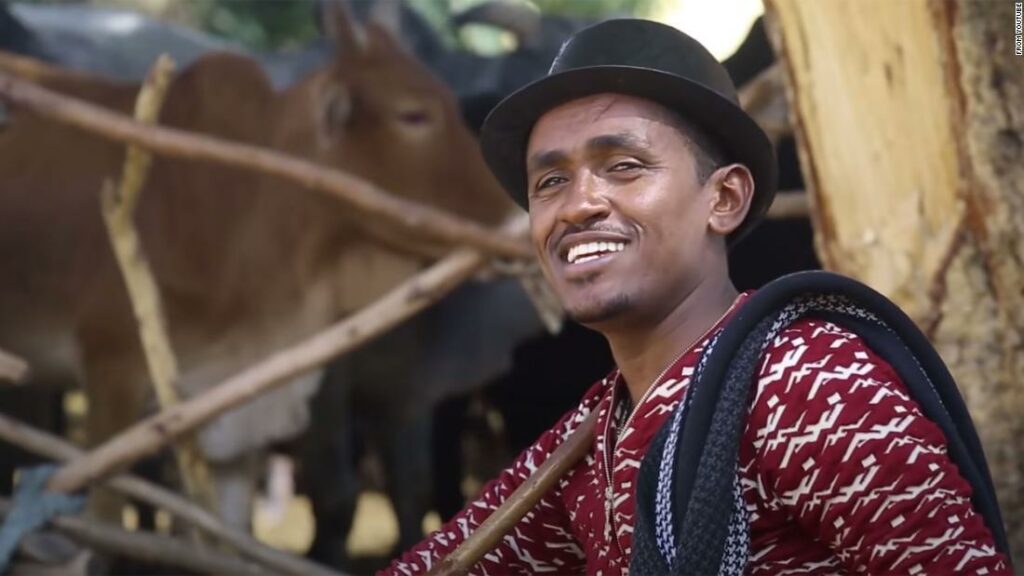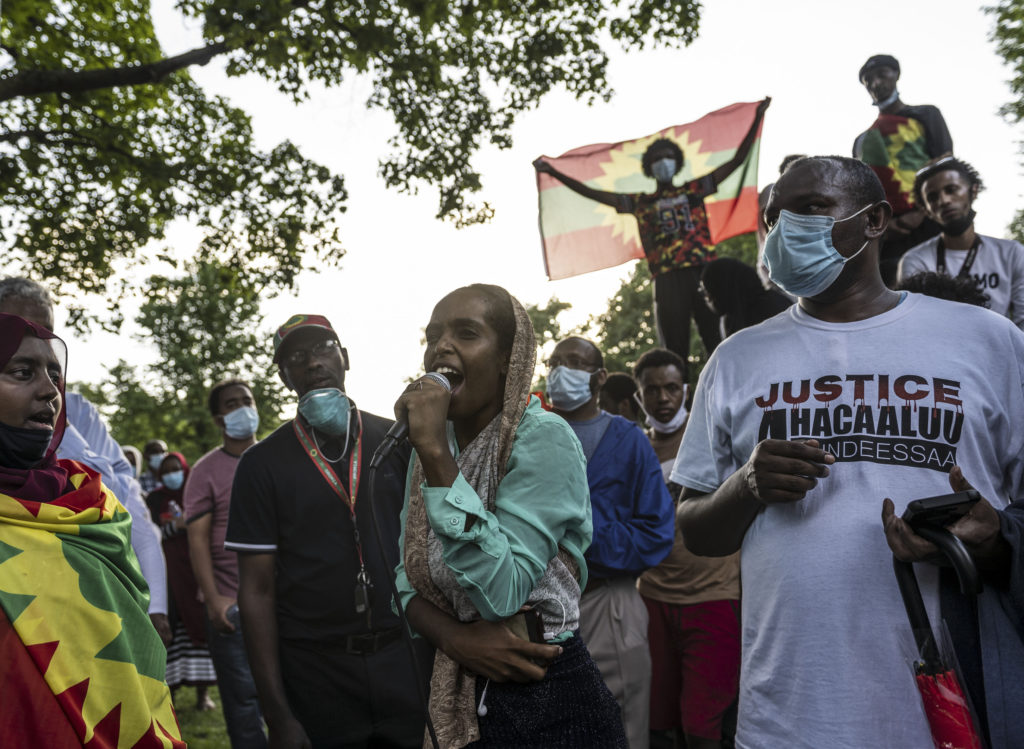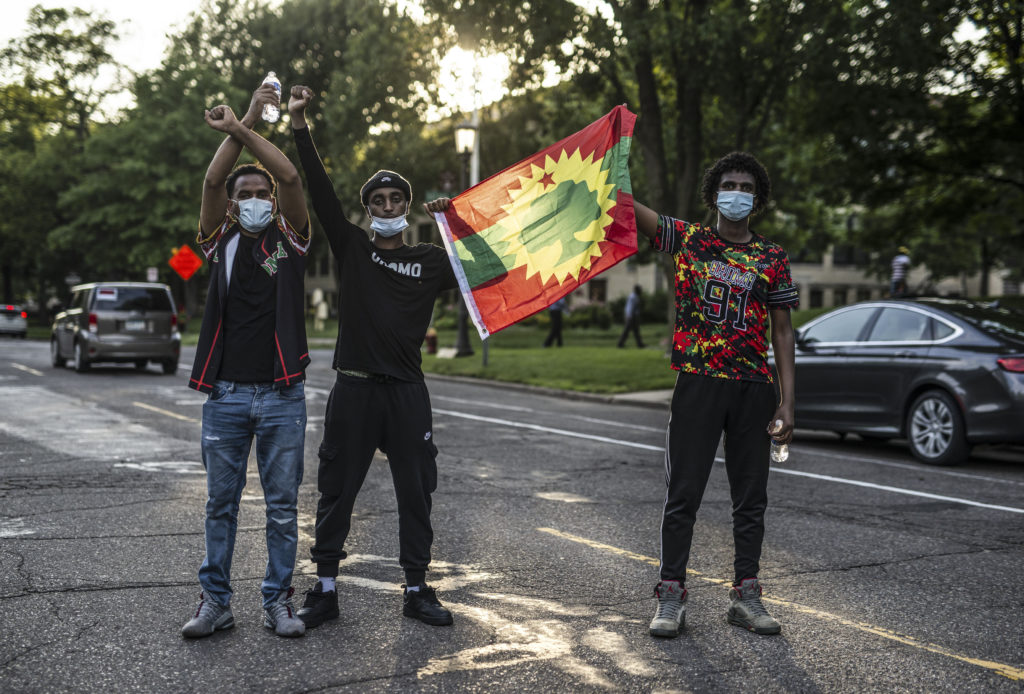(Graphic: John McCann/M&G)
At least 50 people are dead after a day of unrest in Ethiopia, sparked by the murder in Addis Ababa on Monday of renowned musician and activist Hachalu Hundessa. Amid an internet blackout, security forces have arrested journalists and political leaders of the Oromo.
On Tuesday morning, thousands of people went into the streets near Addis Ababa’s St Paul Hospital where a post-mortem examination was being carried out. The vehicle carrying his coffin as he left the hospital was swarmed by youths, few of whom were wearing the mandatory protective face masks. Such is the effect the 34-year-old singer had on his millions of fans.
This impromptu funeral procession of sorts was broadcast live on local outlet Oromia Media Network (OMN). Shortly afterwards, police ransacked the broadcaster’s offices and detained several staff members. “The police have rounded up our journalists and destroyed property at our Addis Ababa headquarters,” said Kitaba Megersa, an OMN board member. “A few of our employees had to escape police, but others were arrested either during the raid on headquarters or out in the field while covering the mourning.”
Among those arrested were members of the Oromo Federalist Congress opposition party, Jawar Mohammed and Bekele Gerba. The arrests have sent shockwaves across the country, as their influence is almost unparalleled among opposition candidates. The government reacted by shutting down internet access across the country in an attempt to either quell the protests or stem the flow of information.
“Nobody is above the law,” federal police commissioner Endeshaw Tassew said in an address on state media. “The group of detainees led by Jawar Mohammed attempted to bring the body for burial in Addis Ababa, against the wishes of his family. A police officer was killed in a violent scuffle by a member of the group’s entourage.”
Endeshaw said that weapons were confiscated from Jawar’s bodyguards, and that 35 people were arrested. No explanation was given for the raid on the OMN’s office.
Later on Tuesday evening, gunshots were heard in Addis Ababa, as well as three explosions.
Police say several suspects in Hachalu’s murder have been arrested.
Human Rights Watch’s Horn of Africa director, Laetitia Bader, said: “Ethiopian authorities should respond to reports of protests in Addis Ababa and other cities and towns following the killing of popular Oromo singer Hachalu Hundessa by acting urgently to reduce tensions and to ensure security forces do not make a combustible situation worse. The government should order security forces not to use excessive force or carry out arbitrary arrests, including against protesters, as they have often done in the past.”
The internet blackout and closure of OMN was condemned by the Committee to Protect Journalists, a nonprofit organisation promoting press freedom worldwide. “Ethiopian authorities’ persistence of old patterns of censorship in response to crises, when the public most needs access to timely news and information, is deeply disappointing,” said sub-Saharan Africa representative Muthoki Mumo. “Authorities should immediately end the internet blackout, free the Oromia Media Network journalists detained in the course of their work, and guarantee that members of the press can report on this moment of protest without fear for their safety or of losing their liberty.”
Songs of injustice
Hachalu — aged just 34 when he was killed — was a larger than life figure, popular for his outspokenness and his use of music to advocate for the rights of the Oromo. The country’s largest ethnic group has endured systematic repression by the central government for much of Ethiopia’s modern history.
In the 2000s, the government incarcerated thousands of Oromo, including Hachalu.
His beginnings in the town of Ambo were like that of any other boy, until he was imprisoned at the age of 17 on suspicion of links to the Oromo Liberation Front, a banned political party. He spent five years behind bars until a judge ruled that he must be released for lack of evidence. He was given no compensation for his wrongful imprisonment.
 Renowned musician and activist Hachalu Hundessa.
Renowned musician and activist Hachalu Hundessa.
While behind bars, with hundreds of other young men like him in prison on trumped up charges, Hachalu became convinced that amplifying the plight of the Oromo through his music was his true calling.
His 2015 hit single Maalan Jira, epitomises Hachulu’s vision, and will remain the cornerstone of his legacy. The song is a catchy, melodious and vibrant beat for those who don’t understand the language Afaan Oromo. But to understand the words is to recognise his status as a master lyricist. Behind the uplifting tune is a lament of historical injustices suffered by Oromo farmers over half a century. The urbanisation of much of Ethiopia over the course of the 20th century made victims of Oromo farming communities, who were pushed further and further away from Addis Ababa.
The release of the single came shortly after the announcement of an expansion of Addis Ababa into surrounding areas. The plan did not include compensation for the inhabitants of these areas. The issue was so charged that it sparked a wave of protests in November 2015. Oromos took to the streets of towns and villages to call for the cancellation of the plan, singing along with Hachalu as they did so, galvanised by his lyrics and melodies that pulled on the heartstrings.
 Mawardi Moussa speaks to a crowd gathered to protest the death of musician and activist Hachalu Hundessa outside the Governor’s Mansion on June 30, 2020 in St Paul, Minnesota. Hundessa, was shot and killed in Addis Ababa, Ethiopia on June 29. He was known for his protest songs which resonated within the Oromo ethnic group. (Stephen Maturen/Getty Images/AFP)
Mawardi Moussa speaks to a crowd gathered to protest the death of musician and activist Hachalu Hundessa outside the Governor’s Mansion on June 30, 2020 in St Paul, Minnesota. Hundessa, was shot and killed in Addis Ababa, Ethiopia on June 29. He was known for his protest songs which resonated within the Oromo ethnic group. (Stephen Maturen/Getty Images/AFP)
Protests ignited elsewhere in the country, primarily in the Amhara region. With the nation brought to a gridlock, it became impossible for the status quo to remain. These political pressures are ultimately what catapulted Prime Minister Abiy Ahmed — himself Oromo, albeit affiliated with the ruling party rather than the political opposition — into office. Aby said in a tweet of Hachalu’s killing that Ethiopia had “lost a precious life today”.
In 2017, Hachalu released Jirra, which translates to “we are here,”, and was far more uplifting than his previous hit. Hachalu celebrated gains made by Oromo society as a whole, and paid tribute to the sacrifice that it took to come this far. As renowned Oromo scholar and Keele University lecturer Awol Allo described it, Jirra “embodied a newfound collective optimism, a feeling that Oromo culture is no longer in jeopardy, and a sense that the Oromo society is finally in the middle of a robust ascendancy”.
In perhaps his most daring performance while on stage during a 2017 benefit concert at Addis Ababa’s Millenium Hall, he issued a call for the Oromo to “mount their horse and march on [Addis Ababa]”. It was interpreted by Ethiopia’s broadcast authority as a call to unseat the government and the concert’s live feed was immediately interrupted.
“It was very distressing, how could they play this live,” said broadcast authority head Zeray Asgedom at the time. “Get your horse, take over the city. How can [Hachalu] sing this?”
Hachalu would later clarify the meaning of his message with a local television channel, LTV. He said that Oromo horsemen, who fought and repulsed invading colonial Italian forces at the 1896 Battle of Adwa, “have no reason not to remove the power in the Presidential Palace committing atrocities against the innocent”. His comments sent shockwaves through Ethiopian society, which was so accustomed to strict state censorship laws.
 A group poses for a portrait while doing a crossed-arms gesture and holding an Oromo flag during a protest of the death of musician and activist Hachalu Hundessa outside the Governor’s Mansion on June 30, 2020 in St Paul, Minnesota. Hundessa, was shot and killed in Addis Ababa, Ethiopia on June 29. The “X” gesture was made famous in 2016 by Olympic Marathon silver medalist Feyisa Lilesa, it is meant to show solidarity with the Oromo people. (Stephen Maturen/Getty Images/AFP)
A group poses for a portrait while doing a crossed-arms gesture and holding an Oromo flag during a protest of the death of musician and activist Hachalu Hundessa outside the Governor’s Mansion on June 30, 2020 in St Paul, Minnesota. Hundessa, was shot and killed in Addis Ababa, Ethiopia on June 29. The “X” gesture was made famous in 2016 by Olympic Marathon silver medalist Feyisa Lilesa, it is meant to show solidarity with the Oromo people. (Stephen Maturen/Getty Images/AFP)
Months later, the long-awaited overhaul in government took place, with Abiy taking charge. Hachalu thrived; Zeray was dismissed from the broadcasting authority.
Hachalu leaves behind a wife and three children. He will be buried in his hometown of Ambo.
This article has been updated to reflect the number of fatalities in the protests. At the time of publication, there had been 10 reported deaths. The number has since risen.